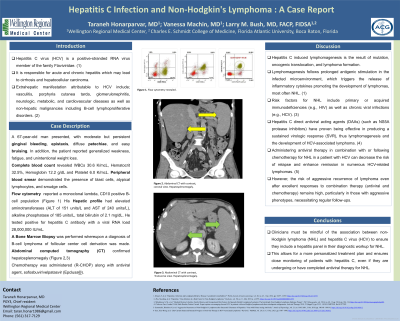Sunday Poster Session
Category: Liver
P1415 - Hepatitis C Infection and Non-Hodgkin's Lymphoma: A Case Report and Literature Review
Sunday, October 27, 2024
3:30 PM - 7:00 PM ET
Location: Exhibit Hall E

Has Audio
- TH
Taraneh Honarparvar, MD
Nova Southeastern University
Wellington, FL
Presenting Author(s)
Taraneh Honarparvar, MD1, Vanessa Machin, MD1, Larry Bush, MD2
1Nova Southeastern University, Wellington, FL; 2Florida Atlantic University, Wellington, FL
Introduction: Hepatitis C virus (HCV) is a single-stranded RNA virus, belongs to the Flaviviridae family and is responsible for both acute and chronic hepatitis. It also associate with cirrhosis, autoimmune disease such as mixed cryo immunoglobulinemia, and cancers including liver cancer and non-hodgkin's lymphoma.
Case Description/Methods: Hereby, we present case of a healthy 67-year-old man who was referred to the emergency department (ED) due to persistent moderate gingival bleeding, epistaxis, generalized petechiae, easy bruising, and bleeding mouth sores. The patient also reported generalized weakness, fatigue, and unintentional weight loss. Laboratory result revealed leukocytosis with the presence of blasts, atypical lymphocytes and smudge cells. Hepatitis panel was positive for HCV infection. Bone marrow biopsy revealed the diagnosis of B-cell lymphoma of follicular center cell derivation.
Discussion: HCV is implicated in lymphomagenesis through mutation, oncogenic translocation, and lymphoma formation. Lymphomagenesis is the result of prolonged antigenic stimulation in the infected microenvironment, which triggers the release of inflammatory cytokines leads to lymphoma formation such as NHL. Risk factors for NHL encompass both primary and acquired immune deficiencies, particularly in the context of infectious diseases includes HCV and HIV. Antiviral therapy for HCV includes direct-acting antiviral agents (DAAs) such as NS5A protease inhibitors have demonstrated remarkable efficacy in eliminating the virus, resulting in a sustained virologic response (SVR), reducing the incidence of lymphomagenesis compared to untreated individuals, and inducing tumor regression in various HCV-related lymphomas. Administering antiviral therapy in combination with or following chemotherapy for NHL in a patient with HCV can decrease the risk of relapse and enhance remission in numerous HCV-related lymphomas. However, the risk of aggressive recurrence of lymphoma even after excellent responses to combination therapy (antiviral and chemotherapy) remains high, particularly in those with aggressive phenotypes, necessitating regular follow-ups.
Disclosures:
Taraneh Honarparvar, MD1, Vanessa Machin, MD1, Larry Bush, MD2. P1415 - Hepatitis C Infection and Non-Hodgkin's Lymphoma: A Case Report and Literature Review, ACG 2024 Annual Scientific Meeting Abstracts. Philadelphia, PA: American College of Gastroenterology.
1Nova Southeastern University, Wellington, FL; 2Florida Atlantic University, Wellington, FL
Introduction: Hepatitis C virus (HCV) is a single-stranded RNA virus, belongs to the Flaviviridae family and is responsible for both acute and chronic hepatitis. It also associate with cirrhosis, autoimmune disease such as mixed cryo immunoglobulinemia, and cancers including liver cancer and non-hodgkin's lymphoma.
Case Description/Methods: Hereby, we present case of a healthy 67-year-old man who was referred to the emergency department (ED) due to persistent moderate gingival bleeding, epistaxis, generalized petechiae, easy bruising, and bleeding mouth sores. The patient also reported generalized weakness, fatigue, and unintentional weight loss. Laboratory result revealed leukocytosis with the presence of blasts, atypical lymphocytes and smudge cells. Hepatitis panel was positive for HCV infection. Bone marrow biopsy revealed the diagnosis of B-cell lymphoma of follicular center cell derivation.
Discussion: HCV is implicated in lymphomagenesis through mutation, oncogenic translocation, and lymphoma formation. Lymphomagenesis is the result of prolonged antigenic stimulation in the infected microenvironment, which triggers the release of inflammatory cytokines leads to lymphoma formation such as NHL. Risk factors for NHL encompass both primary and acquired immune deficiencies, particularly in the context of infectious diseases includes HCV and HIV. Antiviral therapy for HCV includes direct-acting antiviral agents (DAAs) such as NS5A protease inhibitors have demonstrated remarkable efficacy in eliminating the virus, resulting in a sustained virologic response (SVR), reducing the incidence of lymphomagenesis compared to untreated individuals, and inducing tumor regression in various HCV-related lymphomas. Administering antiviral therapy in combination with or following chemotherapy for NHL in a patient with HCV can decrease the risk of relapse and enhance remission in numerous HCV-related lymphomas. However, the risk of aggressive recurrence of lymphoma even after excellent responses to combination therapy (antiviral and chemotherapy) remains high, particularly in those with aggressive phenotypes, necessitating regular follow-ups.
Disclosures:
Taraneh Honarparvar indicated no relevant financial relationships.
Vanessa Machin indicated no relevant financial relationships.
Larry Bush indicated no relevant financial relationships.
Taraneh Honarparvar, MD1, Vanessa Machin, MD1, Larry Bush, MD2. P1415 - Hepatitis C Infection and Non-Hodgkin's Lymphoma: A Case Report and Literature Review, ACG 2024 Annual Scientific Meeting Abstracts. Philadelphia, PA: American College of Gastroenterology.
